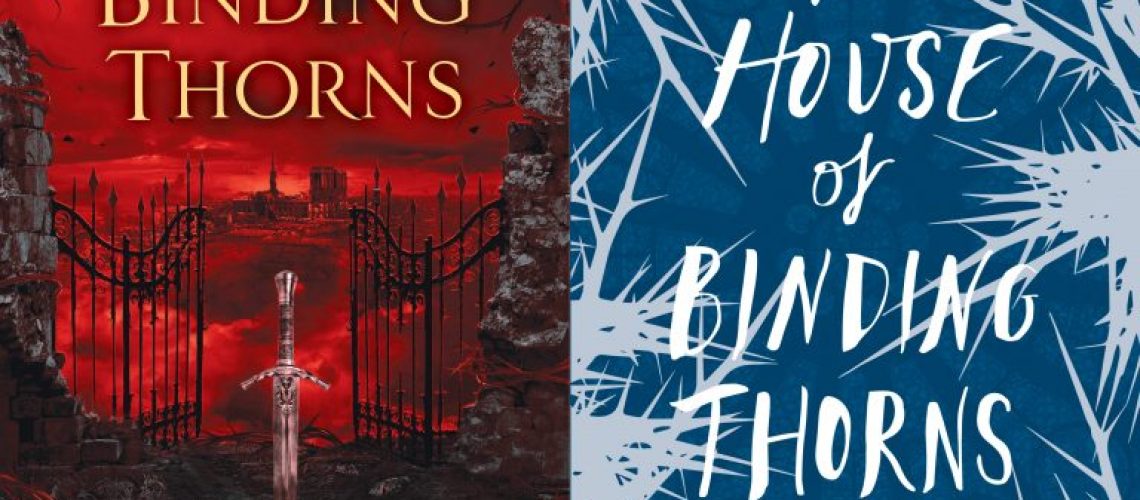Today instead of a review from me, we have a guest post by Aliette de Bodard. Her second Dominion of the Fallen novel, The House of Binding Thorns, is now out, and you will see a review of it from me here soon. In the meantime, Aliette has some words to say about Characters:
I used to struggle a lot with characters.
My natural strength is worldbuilding: I can quite happily spend weeks and months reading non-fiction books on anything from the history of food in Vietnam to the role of servants in 19th-Century Paris, and slowly and painstakingly creating a universe from these inspirations. With characters… my earliest ones were correctly created as part of the setting, but I struggled with giving them individuality and personality beyond that. When I created memorable characters they almost always were by accident rather than by design — while the discovery process was wonderful, it was rather annoying to not be able to repeat that when I needed this!
It took me a rather long time to work out something that should have been really obvious: What makes a character memorable and vibrant is the unexpected. Tropes and archetypes are powerful, but what makes someone feel like a person on the page is how they deviate from them, because this is what strikes the reader — what gives them individuality. And the unexpected is quite probably not the first idea that comes to mind: it’s like reaching out in the dark for something — the first thing you hit is the cliché shelf. The familiar. The comfortable. The easy. That’s not where I want to go.
I’m going to use two characters from my dark Gothic fantasy novel The House of Binding Thorns as examples: Asmodeus and Madeleine. The novel centres on House Hawthorn, one of the foremost magical factions in a ruined and decadent alternate Paris: Asmodeus is a Fallen angel and the head of the House; Madeleine is his subordinate, a former alchemist addicted to a drug called angel essence, which makes the user immensely powerful but corrodes the lungs, drastically shortening life expectancy.
If I followed the path of less resistance, Madeleine — who is principled, determined to do the right thing and prone to acting even when the odds are desperate — would be a heroic protagonist who saves the day (probably against Asmodeus). Or, if I took the essence addiction as the defining characteristic, she would be morally weak and bankrupt.
But she’s not either of those things. I made her the moral compass of the book, but a couple of factors prevent her from being the white knight hero. First is the addiction, but second is that she’s not very good at any of the heroic things: she can’t fight (and this isn’t a prelude to her learning to fight. She never learns, in the course of the book, to be better at fights), she can’t negotiate (this might not be a problem, but the book is focused on a diplomatic mission to an underwater kingdom under the Seine), and while she’s addicted to the high of angel essence magic in her veins and in her lungs, she’s not very good at casting spells outside of some very specific ones (mostly to do with dead bodies *g*).
Similarly, when I created Asmodeus, I drew on the character of Greed from Fullmetal Alchemist. He could easily have been a run-of-the-mill smooth and sarcastic villain, but I was intrigued by the idea of predator/protector: someone who is utterly ruthless, but in service to the protection of those under his wing. During the course of writing The House of Binding Thorns, I had to choose what he’d done in the past, before he rose to be head of House Hawthorn: the easiest answer was to make him leader of the local Inquisition, the Court of Persuasion — because he’s a sadist who likes inflicting pain on others and this seemed like an occupation he’d enjoy.
I’d written it all into the story, when I stopped, and realised what I was doing. Cliché shelf again. Instead, I made him the leader of Hawthorn’s Court of Birth — the one that deals with pregnancy, childbirth and the education of children. Now that was unexpected. And the best part was that, a bit later into the book, his having these skills helped me sort out the plot by writing an unexpected scene that took me some rather startling places (spoilers: it involves a pregnant woman).
So that’s how I do it with characters (the usual disclaimer applies: this works for me, it might not for you — but do give it a try if you haven’t!). Next up: writing a book without tearing my hair out. Ha. I wish!









0 Responses